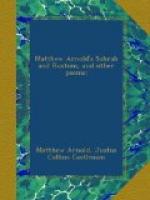TRISTRAM AND ISEULT
The story of Tristram and Iseult is one of the most vivid and passionate of the Arthurian cycle of legends, and is a favorite with the poets. The following version is abridged from Dunlop’s History of Fiction.
“In the court of his uncle, King Marc, the king
of Cornwall, who at this time resided at the castle
of Tyntagel, Tristram became expert in all knightly
exercises.... The king of Ireland, at Tristram’s
solicitation, promised to bestow his daughter Iseult
in marriage on King Marc.... The mother of Iseult
gave to her daughter’s confidante a philtre,
or love-potion, to be administered on the night of
her nuptials. Of this beverage Tristram and Iseult
unfortunately partook. Its influence, during
the remainder of their lives, regulated the affections
and destiny of the lovers.
[168]
“After the arrival of Tristram and Iseult in
Cornwall, and the nuptials of the latter with King
Marc, a great part of the romance is occupied with
their contrivances to procure secret interviews ...
Tristram, being forced to leave Cornwall on account
of the displeasure of his uncle, repaired to Brittany,
where lived Iseult with the White Hands. He married
her, more out of gratitude than love. Afterwards
he proceeded to the dominions of Arthur which became
the theatre of unnumbered exploits.
“Tristram, subsequent to these events, returned to Brittany and to his long-neglected wife. There, being wounded and sick, he was soon reduced to the lowest ebb. In this situation he despatched a confidant to the queen of Cornwall to try if he could induce her to follow him to Brittany.
“Meanwhile Tristram awaited the arrival of the queen with such impatience that he employed one of his wife’s damsels to watch at the harbor. Through her, Iseult learned Tristram’s secret, and filled with jealousy, flew to her husband as the vessel which bore the queen of Cornwall was wafted toward the harbor, and reported that the sails were black (the signal that Iseult, Marc’s queen, had refused Tristram’s request to come to him). Tristram, penetrated with inexpressible grief, died. The account of Tristram’s death was the first intelligence which the queen of Cornwall heard on landing. She was conducted to his chamber, and expired holding him in her arms.”
=1. Is she not come?= That is, Iseult of Ireland. Arnold’s poem takes up the story at the point where Tristram, now on his death-bed, is watching eagerly for the coming of Iseult, Marc’s queen, for whom he had sent his confidant to Cornwall. Evidently he has just awakened and is still somewhat confused; see l. 7. Surely none will fail to appreciate so dramatic a situation.
=5. What ... be?= That is, what lights are those
to the northward, the direction from which Iseult
would come?
[169]
=8. Iseult.= Here Iseult of the White Hands,
daughter of King Hoel of Brittany and wife of Tristram.




